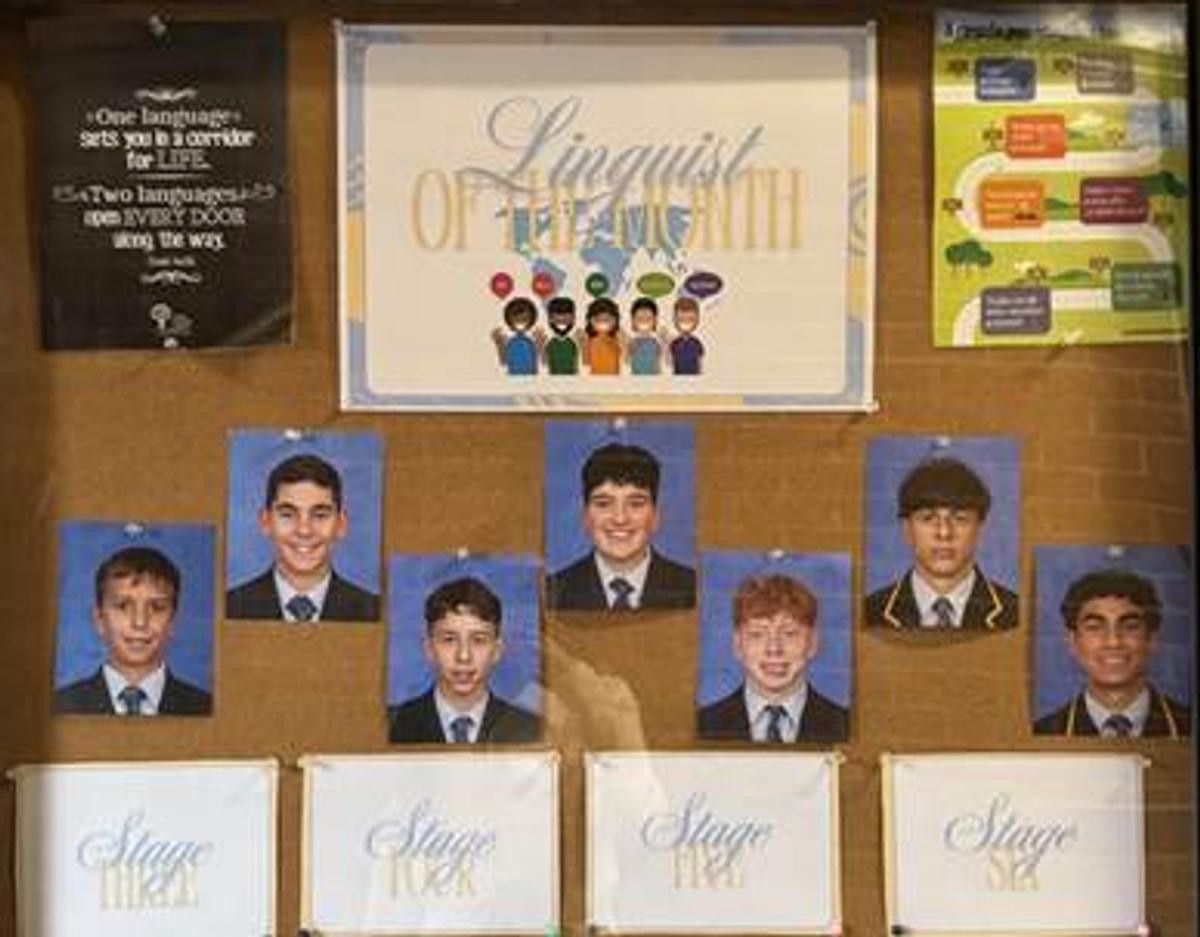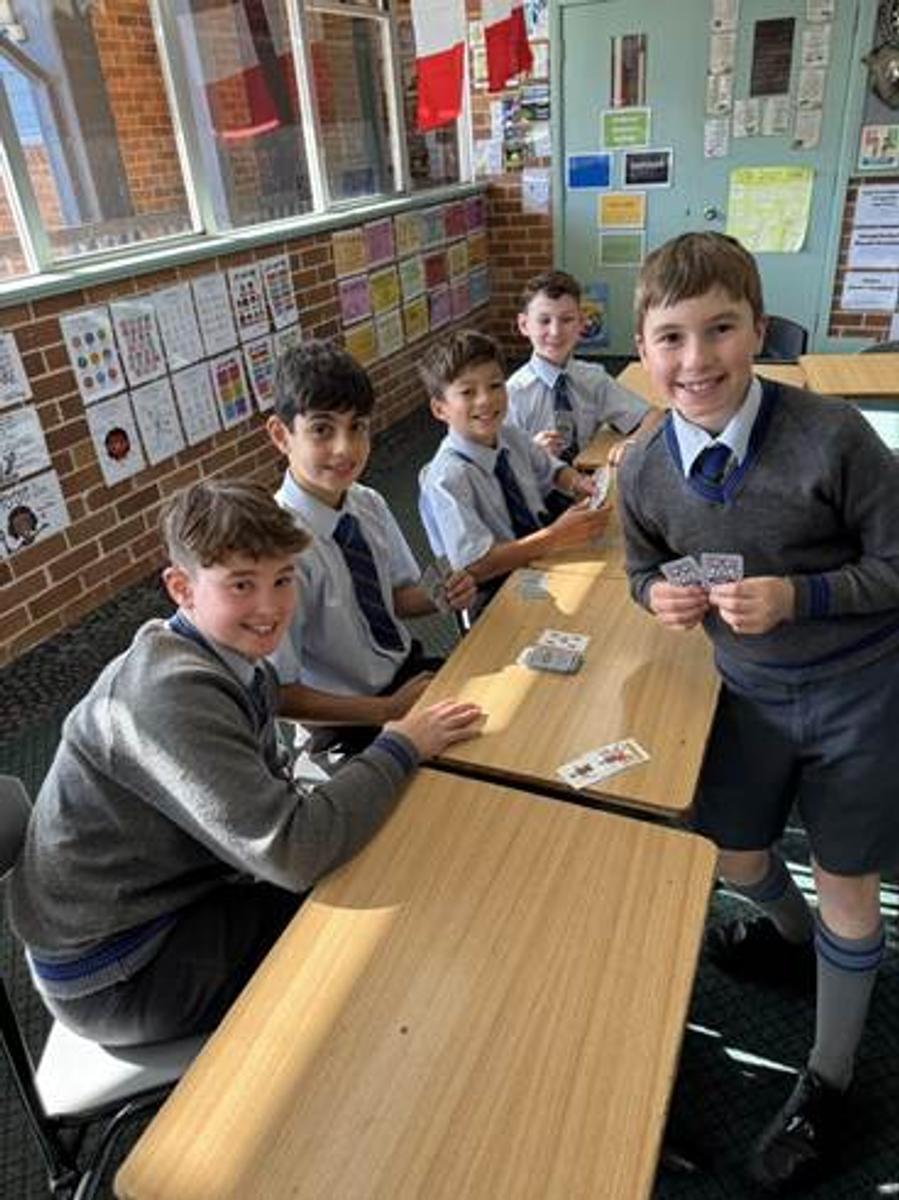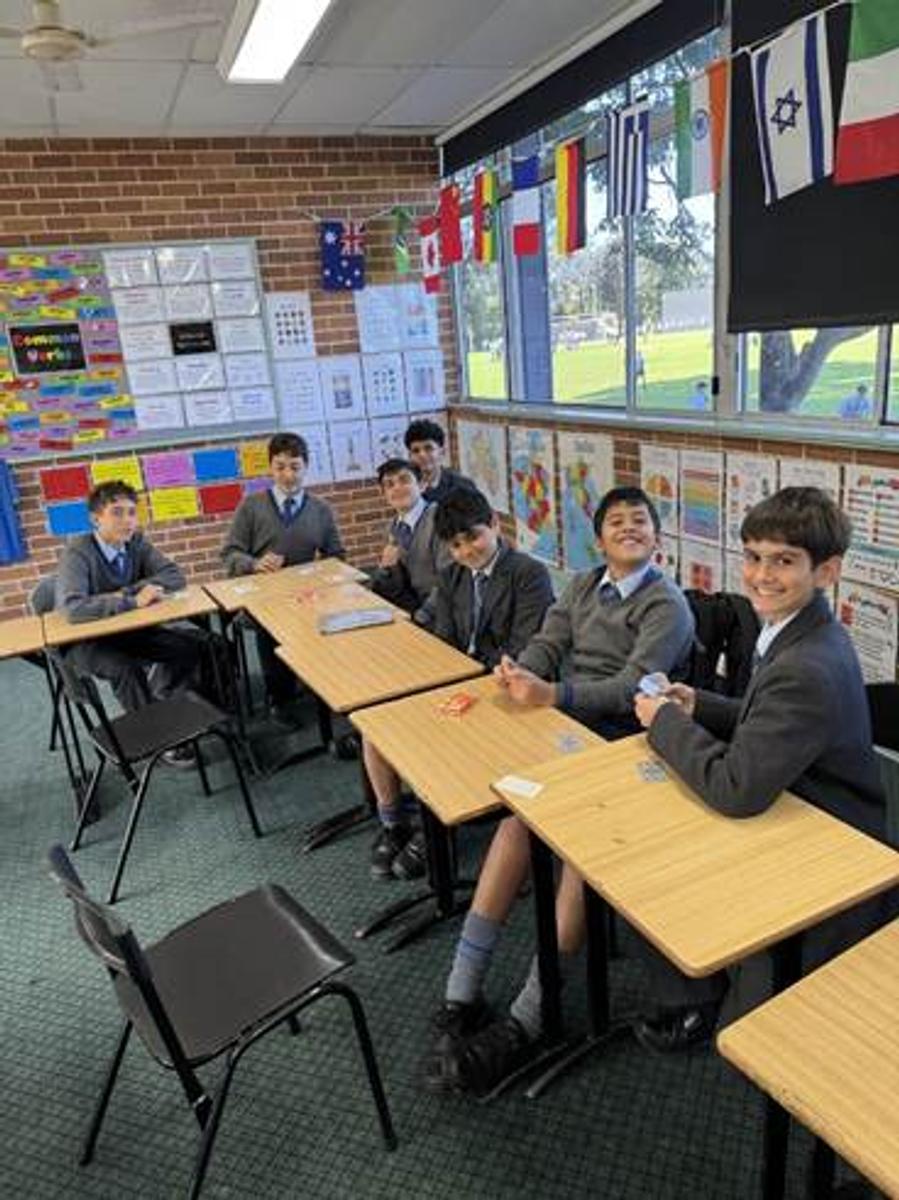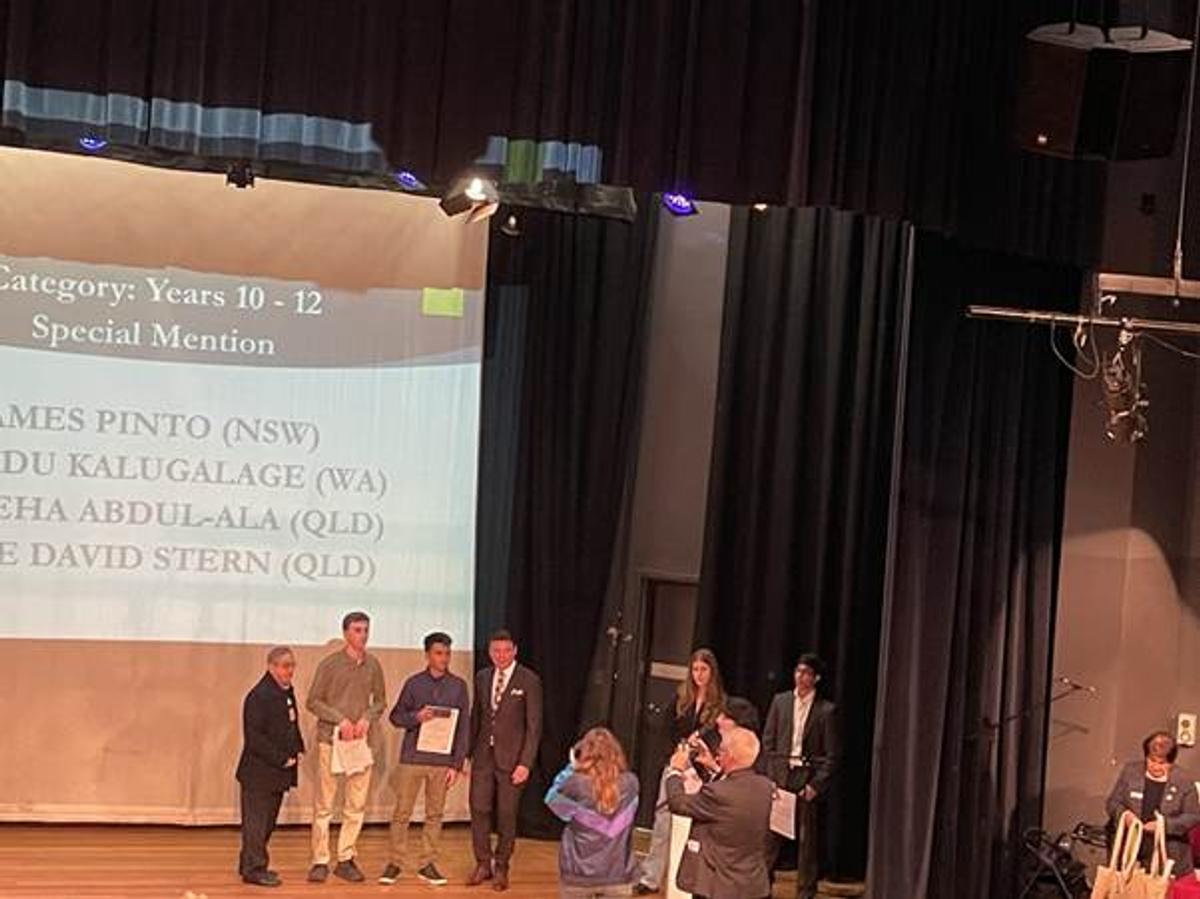Curriculum and Learning
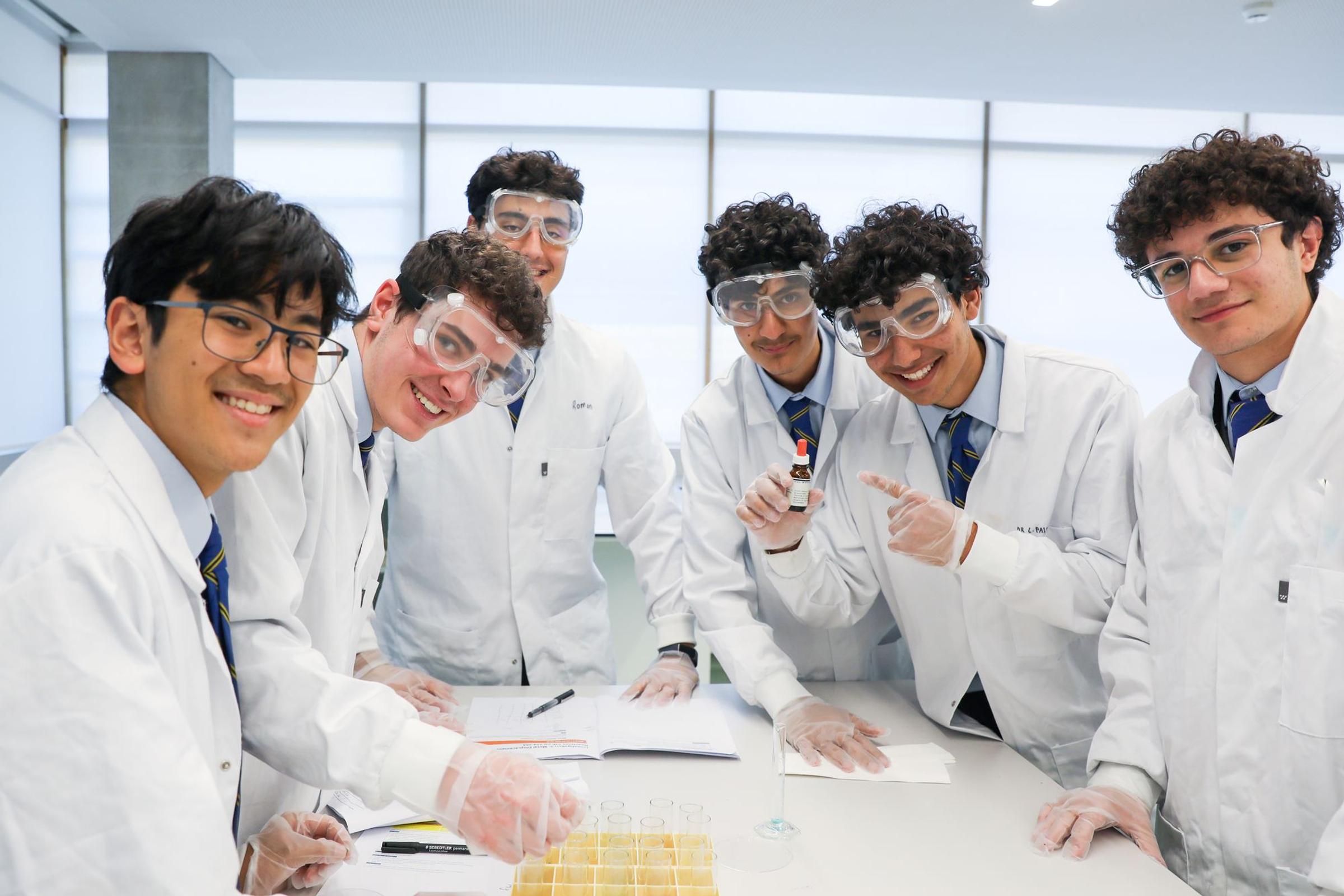
Semester 1 Academic Commendation Certificates for Years 7 to 11
In recognition of academic excellence over the last two terms, the following students from Years 7 to 11 are being presented at their respective Year assemblies with their Academic Commendation in Subject certificates.
Academic Commendation in Subject:
From Year 11
| Michael Bartorilla | Italian Beginners |
| Daniel Basile | Mathematics Standard |
| James Breen | Health and Movement Science |
| Matthew Calderan | Health and Movement Science |
| Jameson Chau-Vuu | Mathematics Advanced |
| Nicholas Conti | Italian Beginners |
| Massimo Costa-Puntillo | Legal Studies |
| Zachary Crisafulli | Music 1 |
| Daniel Fague | Earth and Environmental Science |
| Marc Genovese-Kollar | Visual Arts |
| Julian Giannini | English - Standard |
| Justin Hortinela | Design and Technology |
| Dylan Lapid | Mathematics Standard |
| Joshua La Spina | Economics |
| Matthew Loulach | Mathematics Accelerated |
| Physics | |
| Dion Margaris | Business Studies |
| Economics | |
| English Extension 1 | |
| Christopher Mok | Studies Of Religion I |
| Christian Mouawad | Legal Studies |
| Alexander Moulton | Industrial Technology (Timber Products and Furniture Technologies) |
| Simon Nadile | Italian Continuers |
| Heath Patterson | Biology |
| Health and Movement Science | |
| William Salmo | Health and Movement Science |
| Jake Samaan | Sport, Lifestyle, Recreation |
| Adrian Senese | Modern History |
| Matteo Sesar | English - Advanced |
| Denzel Tan | Chemistry |
| English Extension 1 | |
| Mathematics Accelerated | |
| Mathematics Extension 1 | |
| Music 2 | |
| Studies Of Religion II | |
| William Ters | Drama |
From Year 10
| Pasquale Albanese | Industrial Technology - Engineering |
| Elio Alessi | Italian |
| Physical Activity and Sports Studies | |
| George Avakoumides | Drama |
| Phillip Bressa | English |
| Antony Di Gori | Commerce |
| Andrew Ibrahim | Commerce |
| Jordan Katsoulotos | Commerce |
| Nathan Kadi | Mathematics - Pathway to Advanced/Extension |
| Aidan Lee | Photographic and Digital Media |
| Owen Leung | Design and Technology |
| Music | |
| Lachlan Mcdonald | Food Technology |
| Dom Moses | Physical Activity and Sports Studies |
| Joshua Raheb | Computing Technology |
| Music | |
| Religious Education | |
| Ruben Rochester | Personal Development, Health and Physical Education |
| Gregory Smith | History |
| Science | |
| Jackson Tan | Mathematics - Pathway to Advanced/Extension |
| Henry Whitehead | Mathematics Accelerated |
| Logan Young | English |
| Geography | |
| Noah Young | Industrial Technology - Timber |
| Visual Arts |
From Year 9
| Ryan Banaghan | Industrial Technology - Engineering |
| Lucas Bitar | Commerce |
| Paul Boumelhem | Physical Activity and Sports Studies |
| Myles Chan | Mathematics Accelerated |
| Emilio Cotroneo | Commerce |
| Alexander Dabit | Mathematics - Pathway to Advanced/Extension |
| Miguel De Nobrega | English |
| History | |
| Personal Development, Health and Physical Education | |
| Religious Education | |
| Mattias Doherty | Computing Technology |
| Adriano Guerrieri | Italian |
| Nathaniel Hoang | Music |
| Photographic and Digital Media | |
| Isaac Lorenzo | Science |
| Julian Minadeo | Food Technology |
| Julian Reinhardt | Drama |
| Will Taylor | Industrial Technology - Timber |
| Visual Arts | |
| Yianni Thanos | Food Technology |
| Nathan Wong | Design and Technology |
| Geography |
From Year 8
| Alexander Angelakis | Geography |
| Science | |
| Camilio Chelala | Italian |
| Mathematics | |
| Science | |
| Alex Jun | Religious Education |
| Ethan Lee | Technology |
| Henry Le | Religious Education |
| Luca Madejski | Geography |
| Ryley Mcleod | Personal Development, Health and Physical Education |
| Zachary Nguyen | English |
| Geography | |
| Italian | |
| Science | |
| Thomas Petracca | Music |
| Nicholas Quaratiello | Visual Arts |
| Nicholas Sollazzo | History |
| Zane Young | Technology |
From Year 7
| Patrick Abi Abdallah | Religious Education |
| James Burnicle | History |
| Personal Development, Health and Physical Education | |
| Owen Byrne | English |
| Max Cipollone | Mathematics |
| Isaac Gill | Mathematics |
| Felix Nguyen | Music |
| George Mouawad | Science |
| Lachlan Nguyen | Music |
| Marko Sesar-Pratelli | Technology |
| Damon Tam | Geography |
| Mason Whitehead | Visual Arts |
Michael Cutrupi
Director of Curriculum
Understanding Your Son’s 2025 NAPLAN Results
The 2025 NAPLAN results have now been released. Electronic copies are available via the TASS Parent Lounge and Parent Orbit App, and individual student reports have been mailed home via Australia Post.
For our Year 5, 7 and 9 parents/carers as you begin reviewing your son’s results, I’d like to provide some context about the assessments your son undertook. The NAPLAN tests included:
Writing
Reading
Language Conventions (Spelling, Grammar and Punctuation)
Numeracy.
Because our students complete NAPLAN online, they sit an adaptive version of the test. This means the questions adjust in difficulty based on each student's responses, ensuring a more personalised assessment. As a result, students do not receive identical questions. However, the adaptive design ensures that all results are validly placed on a common NAPLAN scale, with even greater precision than the traditional paper-based test.
There are many highlights from the 2025 NAPLAN results. Please see a snapshot below:
Year 5 2025
NAPLAN Test | Cohort Percentage in Exceeding and Strong |
Writing | 89.4% |
Reading | 88.4% |
Language Conventions: Spelling | 82.9% |
Language Conventions: Grammar and Punctuation | 80.6% |
Numeracy | 93.5% |
Year 7 2025
NAPLAN Test | Cohort Percentage in Exceeding and Strong |
Writing | 82.71% |
Reading | 86.5% |
Language Conventions: Spelling | 89.7% |
Language Conventions: Grammar and Punctuation | 84.7% |
Numeracy | 94.4% |
Year 9 2025
NAPLAN Test | Cohort Percentage in Exceeding and Strong |
Writing | 79% |
Reading | 84.1% |
Language Conventions: Spelling | 89.3% |
Language Conventions: Grammar and Punctuation | 66.7% |
Numeracy | 90.8% |
While these results are wonderful, it is always important to remember that NAPLAN is just one data point in your son’s learning journey. While it provides valuable insights, it reflects performance at a single moment in time; for example, a student being unwell may receive a result that is not in line with their achievement in other tests or in the classroom. Therefore, these results are best understood alongside classroom assessments, other external data we review, such as AAS testing, teacher feedback, and your son’s overall learning progress.
At the College, we use this data in two ways:
To support individual student growth, recognising and celebrating achievements while identifying areas for continued individual development.
To inform our teaching practice, looking for patterns across cohorts, stages, and years, and using that information to refine our teaching to strengthen student outcomes.
Our curriculum teams have already begun analysing this year’s data with these goals in mind and will continue to do so over the coming months. Just as we encourage our students to adopt a growth mindset, our teachers also reflect on this information to reinforce what is working well and to identify opportunities for improvement — ensuring we continue to support every learner in achieving their best.
Gillian Carpenter
Director of Learning and Innovation
Languages Update – Semester 2
This year in Languages, we have reintroduced a number of exciting initiatives designed to support, engage, and celebrate our students in their language learning journey.
Linguist of the Month
Throughout the year, Languages staff have recognised students who have demonstrated outstanding commitment or achievement in the Languages classroom. Each month, one student from each Stage is selected for this honour.
Below are the recipients of the Linguist of the Month award so far in 2025:
Month | Stage | Student | |
February | 3 | Nathaniel Khoury | Nathaniel consistently engages in classroom discussions. He is determined, curious, and shows a strong willingness to tackle challenges. |
4 | Anthony D’Arrigo | Anthony has made an excellent start to the Italian course. He approaches his studies with diligence and enthusiasm, contributing to a positive classroom environment. | |
5 | Charlie Graffeo | Charlie has shown improved commitment to the course and demonstrates dedication to building his language skills. | |
6 | Luca Tuttocuore | Luca has made a strong start to the Continuers course. He provided a quality response to “che tipo di persona sei” with really beautiful and authentic expressions and used a lot of the advice and resources covered in class. | |
March | 3 | Luca Spadaccini | Luca approaches his study of Italian with enthusiasm and diligence. He completes tasks to a high standard and regularly seeks out extension activities to further his learning. |
4 | Levi Harrison | Levi is awarded 'Linguist of the Month' for his consistent effort and commitment to Italian, along with his active participation in class discussions. Keep it up! | |
5 | Antonio Ierardo | Antonio consistently demonstrates dedication to learning through active participation and ongoing efforts to deepen his understanding. | |
6 | Christian Salvato | Christian produced an excellent response to the Reading B question in Task 2. He has worked consistently to strengthen this skill. | |
May | 3 | Lucas D’Agostino | Lucas enthusiastically engages with his study of the Italian language. He is passionate, diligent and completes his work to a high standard. |
4 | Brando Flammia | Brando is always enthusiastic and fully engaged in all lessons. He is a quick learner and asks questions for clarity and is keen to extend himself where possible. | |
5 | Oliver Miliauskis | Oliver has applied himself exceptionally well in his study of Italian. He is diligent and consistent and regularly engages with the language outside of class. | |
6 | Joshua Simon | Josh consistently applies himself to the Beginners course. He demonstrates initiative by asking questions, seeking feedback, and submitting class tasks on time and to a high standard. | |
June | 3 | Felipe Meadows | Felipe has shown great aptitude for learning a language. He picks up on learnt structures quickly and is able to apply them to unseen sentences. He has a good ear for the language and participates actively in class which only assists his overall understanding. |
4 | William Gotsis | William consistently approaches lessons with enthusiasm and a positive attitude. His love for the language is evident in his willingness to participate, ask questions, and extend his learning beyond the classroom. | |
5 | Marcello Romeo | Cello demonstrated admirable leadership during the Italian culture activity on Friday. He also shows a strong understanding of Direct Object Pronouns and actively participates in class discussions. This attitude will serve him well in his senior years. | |
6 | Nicholas Conti | Nicholas' speaking and writing skills are exceptional for a student at the Beginners level. He incorporates a range of vocabulary and language structures in his responses and his consistent practice and attention to detail allow him to communicate with accuracy and ease. | |
July | 4 | Christian Koutsogeorgis | Christian demonstrates great enthusiasm for learning Italian. He actively contributes to class discussions, consistently produces high-quality work, and frequently asks for additional tasks to further extend his understanding of the language. |
5 | Emilio Cotroneo | Emilio enthusiastically engages with his study of Italian. He constantly participates in classroom discussions and completes his classwork to a high standard. | |
6 | Marco LoRusso | Marco took the initiative to send through his holiday homework for marking and chose to keep a journal in Italian during his trip to Alice Springs. A creative and effective way to stay connected to the language while away. |
Carte Club
Last term, we welcomed back the much-loved Carte Club with a fantastic turnout each week. It was heartening to see students from Years 5 to 12 coming together to play traditional Italian card games such as Scopa and Briscola. This initiative will continue for the rest of the year and runs every Tuesday at lunchtime in Raymer 15.
Parental Polyglots – Italian Classes for Parents and Carers
We are also excited to announce the return of the Parental Polyglots Program, an initiative designed to enhance student success in Italian by fostering meaningful parental involvement. Parents/carers will be invited to learn Italian alongside their sons. This program aims to strengthen the partnership between home and school, increase student motivation, and build a culturally enriched and inclusive community. By equipping parents/carers with language skills that mirror their children's learning, we not only promote stronger academic outcomes but also reinforce our College’s commitment to liberating education, an inclusive community, and justice and solidarity in the Edmund Rice tradition. Whether you are a beginner or just curious, we welcome all parents/carers to become part of this exciting and supportive language-learning journey.
If you are interested, please complete this form to register your details. We are currently gauging interest and availability. Please submit the form by Monday 11 August.
COASIT Language Assistants
We would like to thank Marianna and Giulia, our COASIT Italian Language Assistants, for their contribution to our students’ learning in the first half of the year and for helping them to prepare for their upcoming HSC Oral Examinations. Their last day with us will be Wednesday 8 August.
We now look forward to welcoming Marta and Grazia, who will continue this valuable role for the remainder of 2025.
Italian Education Awards
Each year, students are invited to participate in the Italian Education Awards, coordinated by Gruppo dell’Amicizia in memoria di Enrica Inglese. This competition requires students to submit an extended essay in Italian on a topic relevant to contemporary society.
This year, James Pinto (Year 12) was formally recognised for his submission at a ceremony held at the Italian Forum Cultural Centre on Saturday 26 July.
This year’s theme: Artificial Intelligence is one of the most revolutionary topics of our time. Analyse the advantages and disadvantages of artificial intelligence in modern society. How could it better the lives of people in different sectors such as health, education, transport and work? What are the main risks and the possible long-term consequences for society, the economy and daily life?
James’ thoughtful and insightful essay in Italian earned him recognition among students across New South Wales. Here is his essay:
È innegabile a dire che l’intelligenza artificiale è una delle tecnologie più rivoluzionarie del nostro tempo. Ha spazzato la nostra società senza avvertimento, e adesso rimane per sempre. Nella mia opinione, sia importante a ricordare che mentre ci sono un sacco di vantaggi dell’uso dell’IA in diversi settori, ci sono anche svantaggi che adesso stanno crescendo e diventare problemi urgenti nella nostra società. L’IA ha potuto migliorare la produttività nei tanti lavori, eliminare l’errore umane, e anche creare la possibilità di ricevere l’aiuto a tutte le ore, 24/7. In più, ha fatto tanto per cambiare i settori come la sanità, l’educazione, i trasporti e il lavoro. Ma anche ha spostato tanta gente dai suoi lavori, è compromesso la privacy da tanta gente, e si è indebolito la nostra abilità di risolvere i problemi. Quindi, è evidente che mentre l’IA ci abbiamo aiutati un sacco, ci sono svantaggi, e dobbiamo stare attente a preservare la nostra privacy e i nostri lavori.
Ci sono tantissimi vantaggi dell’uso dell’IA che adesso stanno iniziando a rivelarsi nella società, specialmente nei settori come la sanità, l’educazione, i trasporti e il lavoro. Ma inizio a parlare in generale, perché l’impatto dell’IA non è prenotato per questi settori. Nei lavori ripetitivi, l’uso dell’IA può migliorare la produttività tantissimo, perché elimina l’errore umane e può fornire risultati coerenti quando uno c’ha bisogno. Nel mondo del lavoro, uno studio condotto dal KPMG ha trovato che i datori di lavoro si aspettano un aumento di 46% della produttività con l’uso dell’IA per i lavori ripetitivi come inserimento dati e manutenzione predittiva. In più, Salesforce ha trovato che lavorati uffici passano 47% del suo tempo a fare i compiti a basso valore, che l’IA può sostituire. Inoltre, l’IA è dispensabile a tutte le ore, e quindi se uno volesse cercare aiuto o chiedere una domanda a mezzanotte, non c’è bisogno che uno dovrebbe aspettare per la mattina.
Aggiunto, l’IA non è prevenuto, e può analizzare i dati senza pregiudizio personale, ed anche può tagliare i costi per gli affari. Nel settore della sanità, l’IA può fornire le diagnosi più veloci e corretti, aiutando i pazienti per migliorare più velocemente. L’IA può creare i piani personalizzati per migliorare, e con una buona conoscenza della vita di qualcuno, può prevedere i problemi saluti. Per l’educazione, l’IA può fornire apprendimento personalizzato, per segnare i compiti immediatamente e dare consigli per migliorare, e anche crea la possibilità di apprendimento a tutte le ore ovunque. Nel settore dei trasporti, l’IA è stato importantissimo per nuove tecnologie come le macchine autonomiche, è aiutato per fare il controllo del traffico più efficiente, ed anche ha migliorato la sicurezza negli aerei e treni.
Quindi, è ovvio che l’IA è una delle tecnologie più rivoluzionarie del nostro tempo, perché ci sono tantissimi vantaggi nei settori come la sanità, l’educazione, i trasporti, e il lavoro che hanno avuto un impatto innegabile sulla nostra società.
Mentre l’uso dell’IA ha tantissimi vantaggi, penso che sia più pertinente a ricordare come ha un impatto negativo sulla nostra società. L’IA può sostituire tanti lavori delle persone nelle industrie, come nei call center, riducendo la disponibilità dei lavori per tanti. Per queste persone, un lavoro è cruciale per sostenere una famiglia e vivere, e l’uso dell’IA ha la possibilità di schiacciare i vulnerabili nella nostra società. In più, l’IA manca giudizio umano e la percettività, e quindi può fare decisioni logichi senza di apprezzando le situazioni delle persone, e che quindi non sono giusti. Se l’IA diventasse hackerato, la privacy di tante persone può essere compromesso, e i criminali possono trovare l’informazione di una propria persona. Una cosa mancata sempre anche è che un’eccessiva dipendenza sulla tecnologia nella società può indebolire la nostra capacità di risoluzione dei problemi e ridurre l’interazione umana nella società. C’è anche il problema delle diseguaglianze tra le aziende ricchi e poveri, perché quelle ricchi possono permettersi servizi di intelligenza artificiale più avanzati. Un'altra conseguenza di questa è che la ricchezza si concentra nelle aziende tecnologiche, che speso possono essere volatili. Finalmente, c’è il problema per il social media, perché l‘IA può promuovere dipendenze a causa di contenuti personalizzati come lo scorrimento su Tik Tok, e anche può creare i Deepfake che possono dipingere le persone sotto una luce sbagliata, compromettendo la privacy. Quindi, è evidente che anche ci sono aspettativi negativi dell’uso dell’IA.
In conclusione, l’IA ha trasformato la nostra società, portando tanti benefici, ma non senza conseguenze. Mentre ha portato i vantaggi come l’aumento della produttività e i progressi in vari settori, è fondamentale riconoscere anche i rischi, come la perdita di lavoro e la compromissione della privacy. Quindi, dobbiamo usare l’IA con attenzione, proteggendo i nostri diritti e il nostro futuro.
|

